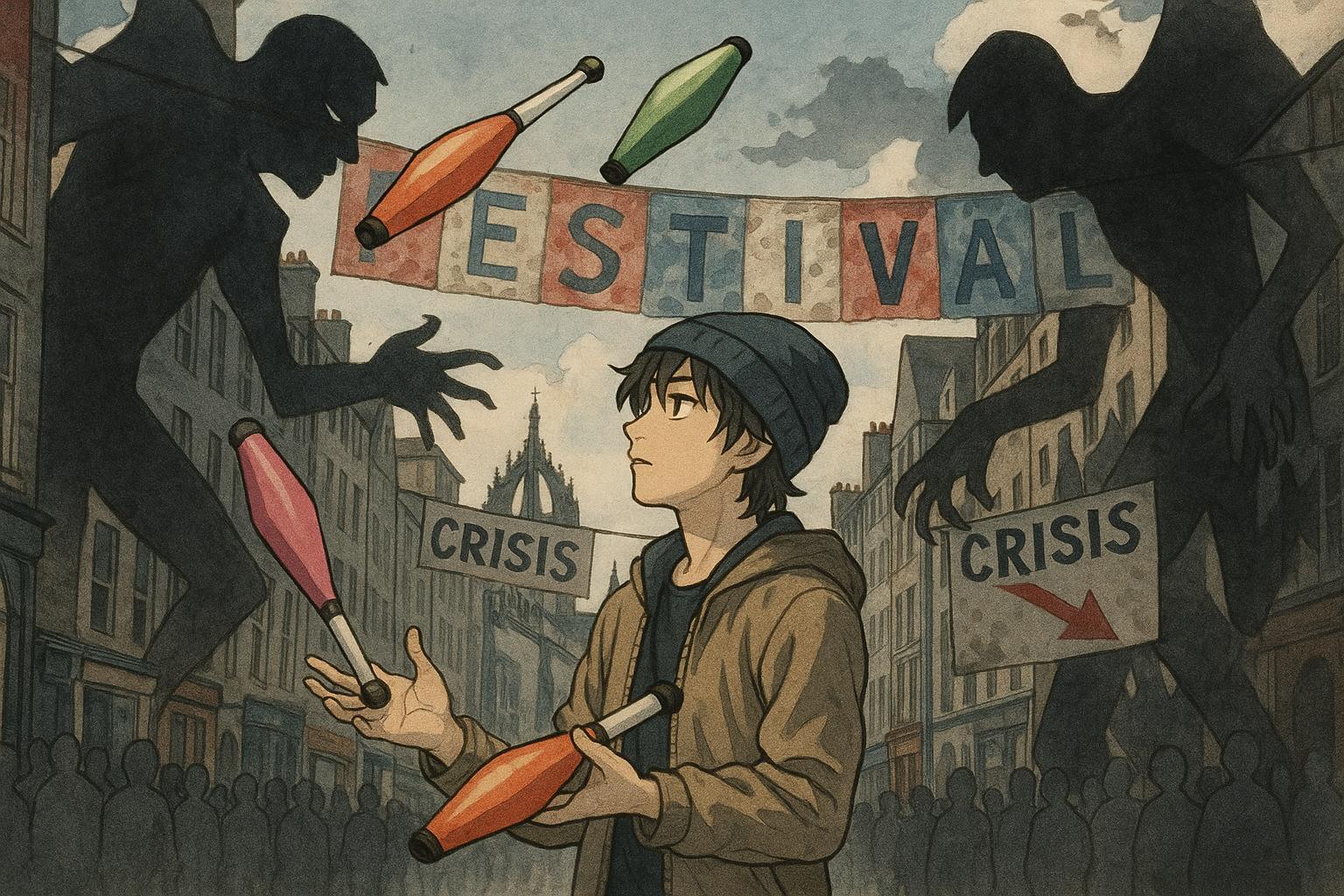As mounting costs and reduced sponsorship push the Edinburgh Festival Fringe towards a financial tipping point, organisers call for urgent support from local businesses and government to preserve the festival’s world-class street theatre tradition, which is at serious risk ahead of this year’s event.
The Edinburgh Festival Fringe, renowned for its vibrant street theatre and eclectic performances, is facing a financial crisis that threatens its future. Organisers have revealed that the cost of running official performance spaces has surged, leading to a call for local businesses to contribute £250,000 to cover essential expenses such as staffing, safety, and infrastructure, including temporary toilets and storage for performers. Street events have become a staple of the festival, attracting visitors to the Royal Mile since the 1970s, but mounting financial pressures have put these free performances of jugglers, acrobats, and buskers at serious risk.
The crisis stems from multiple factors: the loss of significant sponsorship, dwindling public funding, and increased costs imposed by the city council. The primary public support for street events this year is limited to a £75,000 grant, which is a mere fraction of the festival’s overall financial needs. The Scottish Government has yet to confirm any additional support for the upcoming festival, scheduled to begin in just weeks. The Fringe Society’s financial difficulties are compounded by a new charging regime levied by the city council, leading to a potential debt of over £40,000 in repayments.
Francesca Hegyi, Chief Executive of the Edinburgh International Festival, echoed similar sentiments of concern regarding the funding landscape for arts festivals in Scotland. She labelled the current funding model as “utterly broken,” warning that without reforms, the cultural programmes across Edinburgh could face significant downsizing. The Edinburgh festivals, which collectively contribute over £200 million to Scotland’s economy, are at a pivotal moment, with multiple stakeholders advocating for governmental and corporate partnership reforms to ensure sustainability.
Local leaders like Margaret Graham, the city council’s culture convener, have acknowledged the importance of the Fringe to Edinburgh’s cultural fabric and have indicated that the council is committed to supporting the event through grants and operational assistance. However, the Fringe Society has pointed out that the burden of securing adequate funding is increasingly daunting as competition from other festivals across the UK grows.
In the wake of these mounting challenges, Tony Lankester, CEO of the Fringe Society, underscored the need for urgent discussions around financial sustainability for the festival’s street events. The society is actively seeking new partners and supporters to ensure the continuation and vibrancy of these performances, which are central to the festival experience for both residents and tourists. He emphasised that maintaining the quality of these street events is essential, describing them as “world-class” and integral to Edinburgh’s identity every August.
The Fringe Society has indicated a willingness to adapt by reassessing its operational model post-Covid, but this will require a concerted effort from local businesses and government bodies to forge a sustainable path forward. With the festival’s reputation on the line and its integral role in Scotland’s cultural landscape at stake, there is a pressing need for collaborative action to safeguard the future of Edinburgh’s celebrated Fringe.
 Reference Map:
Reference Map:
- Paragraph 1 – [1], [3]
- Paragraph 2 – [1], [2], [4]
- Paragraph 3 – [2], [3], [5]
- Paragraph 4 – [1], [6]
- Paragraph 5 – [1], [7]
- Paragraph 6 – [3], [4]
Source: Noah Wire Services
- https://www.heraldscotland.com/news/25231251.future-edinburgh-festival-fringe-street-theatre-risk/?ref=rss – Please view link – unable to able to access data
- https://www.ft.com/content/0382d3e5-3730-46ef-bc57-05584f5d6a54 – Francesca Hegyi, Chief Executive of the Edinburgh International Festival, has declared the current arts funding model as ‘utterly broken,’ warning of downsized cultural programmes unless reforms are made. Stagnant state funding and a challenging corporate sponsorship environment have created a severe financial crisis, with the festival running historic deficits. The International Festival, alongside the Fringe and other events crucial to Edinburgh’s cultural landscape, relies heavily on public funding, philanthropy, and corporate sponsorship. However, ethical scrutiny and economic pressures have complicated sponsorships, and confidence in public funding remains low despite government pledges. Edinburgh’s festivals significantly contribute to Scotland’s economy, but without substantial funding reforms, their future and ability to compete globally are at risk. Municipal and national governments are exploring new funding mechanisms, such as a potential visitor levy, to support the arts amid increasing financial and political pressures.
- https://www.artsprofessional.co.uk/news/edinburgh-fringe-crisis-point-organisers-warn – Organisers of the Edinburgh Fringe Festival have warned that the event is at ‘crisis point’ and requires ongoing government support to remain economically viable. The Fringe Society has called for long-term investment, stating that the current self-sustaining funding model is no longer viable, with some venues and artists on the brink. While funding announced as part of the Spring Budget is welcome, it can only be put towards establishing a new creative community hub in the city, which is a long way off. The Fringe Society continues to lobby the government for long-term support to secure the future of the annual event.
- https://www.scotsman.com/whats-on/arts-and-entertainment/edinburgh-festival-fringe-scottish-government-accused-of-letting-fringe-fall-through-the-cracks-and-diminishing-festival-city-status-4473746 – Organisers of the Edinburgh Festival Fringe have accused the Scottish Government of letting the event ‘fall through the cracks’ and diminishing Edinburgh’s ‘festival city’ status by failing to provide enough funding. The Fringe Society has suggested that Edinburgh’s long-held ‘festival city’ status is now ‘looking diminished’ due to a lack of serious investment in the face of competition from other UK cities. The Fringe Society has called for £1.5 million to be invested annually in the event, which is said to be worth at least £200 million for the economy.
- https://www.euronews.com/culture/2024/04/26/scottish-funding-body-claims-edinburgh-fringe-is-in-precarious-state – Creative Scotland, the Scottish funding body, has claimed that the Edinburgh Fringe is in a ‘precarious’ state. The organisation has been concerned about the proper running of the festival for over a year and warned the Scottish parliament that it was under ‘serious risk of insolvency in the short term’ last September. The insecurity refers to a ‘perfect storm’ of rising costs, standstill funding, pay demands, and the cost of living crisis on arts organisations. Fringe Society CEO Shona McCarthy has spoken about the festival’s financial difficulties, including a deficit of £1.5 million and an outstanding loan of £1 million to the Scottish government for pandemic relief.
- https://www.scotsman.com/news/scottish-news/revealed-edinburgh-festival-fringe-to-get-scottish-government-funding-package-after-7-year-battle-5026917 – The Edinburgh Festival Fringe is set to receive a funding package from the Scottish Government after a seven-year battle. The £300,000 package will enable work in two areas agreed between the Scottish Government and the Fringe Society: developing the capabilities of the society’s data and digital infrastructure to make the Fringe more accessible for artists, audiences, and venues, and helping Scottish artists and the sector as a whole capitalise on international opportunities. The Fringe has not received core funding since 2018, despite repeated applications.
- https://www.edinburghnews.scotsman.com/whats-on/arts-and-entertainment/edinburgh-festival-fringe-the-stand-pulls-plug-on-biggest-venue-after-acts-and-crowds-stay-away-4414471 – Comedy club operator The Stand has decided to scale back its programme and drop its biggest venue after running into financial problems due to the impact of rising costs and dwindling crowds in the area. The Stand has pulled the plug on staging shows at the New Town Theatre, at the west end of George Street, after making a loss despite a 3 per cent increase in ticket sales this summer. Managing director Mike Jones cited the increasing centralisation of the Fringe in the Old Town and reduced footfall in the west end of George Street as key factors in the decision, along with fewer acts wanting to commit to a full run.
Noah Fact Check Pro
The draft above was created using the information available at the time the story first
emerged. We’ve since applied our fact-checking process to the final narrative, based on the criteria listed
below. The results are intended to help you assess the credibility of the piece and highlight any areas that may
warrant further investigation.
Freshness check
Score:
8
Notes:
The narrative highlights the Edinburgh Festival Fringe’s financial challenges, including increased operational costs and the loss of major sponsors. Similar reports have emerged in recent months, with notable coverage in April 2025 about the Fringe losing a significant commercial sponsor, Johnnie Walker. ([scotsman.com](https://www.scotsman.com/news/scottish-news/edinburgh-festival-fringe-loses-major-commercial-sponsor-in-financial-blow-5089316?utm_source=openai)) Additionally, in November 2023, the Fringe Society reported a deficit exceeding £630,000, emphasizing the need for sustainable funding. ([scotsman.com](https://www.scotsman.com/whats-on/arts-and-entertainment/edinburgh-festival-fringe-organisers-plead-moral-obligation-funding-case-as-large-scale-of-fringe-society-financial-black-hole-revealed-4418025?utm_source=openai)) While the specific figures and details in the provided narrative are consistent with these reports, the exact publication date of the article is not specified, making it challenging to determine if this is a new development or a recycled report. The inclusion of updated data, such as the £250,000 funding request from local businesses, suggests an attempt to provide current information, potentially justifying a higher freshness score. However, without a clear publication date, the freshness score remains moderate.
Quotes check
Score:
7
Notes:
The narrative includes direct quotes from Francesca Hegyi, Chief Executive of the Edinburgh International Festival, describing the arts funding model as ‘utterly broken’ and warning of downsized cultural programmes unless reforms are made. ([ft.com](https://www.ft.com/content/0382d3e5-3730-46ef-bc57-05584f5d6a54?utm_source=openai)) These quotes are consistent with statements she made in July 2024. The repetition of these quotes in the current narrative suggests potential reuse of content. However, without access to the full text of the original article, it’s difficult to assess the extent of reuse or any variations in wording. The presence of these quotes indicates that the narrative may be recycling content from previous reports.
Source reliability
Score:
8
Notes:
The narrative originates from the Herald Scotland, a reputable news outlet. The inclusion of direct quotes from Francesca Hegyi, Chief Executive of the Edinburgh International Festival, adds credibility to the report. However, the lack of a clear publication date and the potential reuse of content from previous reports raise some concerns about the originality and timeliness of the information presented.
Plausability check
Score:
9
Notes:
The claims regarding the Edinburgh Festival Fringe’s financial difficulties, including increased operational costs and the loss of major sponsors, are consistent with recent reports. For instance, in April 2025, it was reported that the Fringe lost a major commercial sponsor, Johnnie Walker. ([scotsman.com](https://www.scotsman.com/news/scottish-news/edinburgh-festival-fringe-loses-major-commercial-sponsor-in-financial-blow-5089316?utm_source=openai)) Additionally, in November 2023, the Fringe Society reported a deficit exceeding £630,000, highlighting the need for sustainable funding. ([scotsman.com](https://www.scotsman.com/whats-on/arts-and-entertainment/edinburgh-festival-fringe-organisers-plead-moral-obligation-funding-case-as-large-scale-of-fringe-society-financial-black-hole-revealed-4418025?utm_source=openai)) The narrative’s claims align with these reports, suggesting that the information is plausible.
Overall assessment
Verdict (FAIL, OPEN, PASS): OPEN
Confidence (LOW, MEDIUM, HIGH): MEDIUM
Summary:
The narrative addresses the Edinburgh Festival Fringe’s financial challenges, including increased operational costs and the loss of major sponsors. While the information aligns with recent reports, the lack of a clear publication date and the potential reuse of content from previous reports raise concerns about the freshness and originality of the content. The inclusion of updated data, such as the £250,000 funding request from local businesses, suggests an attempt to provide current information. However, without a clear publication date, it’s challenging to fully assess the timeliness and originality of the report. Therefore, the overall assessment is ‘OPEN’ with a medium confidence level.













